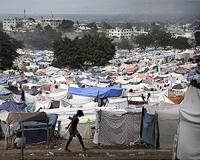| . |  |
. |
Petite Riviere, Haiti (AFP) Oct 28, 2010 Haiti's cholera toll rose Thursday above 300, as doctors sought to contain an epidemic that is seeing desperate patients overwhelm the quake-hit nation's crumbling hospitals. One week after cholera was confirmed in Haiti for the first time in decades, the death rate is slowing but almost 5,000 people have now been infected and officials warn it could be years before it is eradicated. Clinics were beyond capacity, with patients on the floor of one radiology department in Saint-Marc, the outbreak's epicenter some 60 miles (100 kilometers) north of Port-au-Prince. A five-bed maternity center, not well-equipped to treat the virulent diarrheal disease, housed 300 patients. The source of the outbreak is still unclear, although MINUSTAH, the UN peacekeeping force is probing claims its septic tanks leaked into the Artibonite river and contaminated it with fecal bacteria. In the Charles Colimon hospital in Petite Riviere, a small community along the Artibonite, up to 400 patients were packed in Thursday in every available space -- in the corridors, on floors, and in tents surrounding the facility. Residents in this rural town are heavily reliant on the infected river in their everyday lives. The low-lying land is water-logged and irrigation ditches from the river run right past homes where people wash and cook. The rusted iron and plastic roofing of the hospital, the main medical center for a large swathe of the infected area, failed to stop a midday downpour, prompting doctors to rush patients away from leaks. Men in yellow overalls with canisters of disinfectant strapped to their back sprayed the floor between the beds -- crude wood slabs on short posts with holes cut in the middle and buckets of waste underneath. Although easily treated, cholera has a short incubation period -- sometimes just a few hours -- and causes acute watery diarrhea that can quickly lead to severe dehydration and death. For those in the earlier stages of the disease here, oral solutions and packets of rehydration salts were handed out at a pharmacy. "If people are hydrated quick enough, they can be treated easily," said Waking Jean-Baptiste, a doctor liaising between the international medical agency Doctors Without Borders (MSF) and local staff. "The problem is we only have one ambulance, for the whole region, so we hear reports that there are many sick people who cannot reach the hospital," he told AFP. "Without treatment, someone can die in as little as eight hours after infection." Some 1.3 million people displaced by the 7.0 earthquake on January 12 are still crammed into thousands of makeshift camps in Port-au-Prince, and aid agencies fear cholera could spread like wildfire in such conditions. But earlier this week MSF's field coordinator in Saint-Marc was optimistic the epidemic was being controlled. "The fact that we are seeing fewer severe cases is positive," said Federica Nogarotto. "It suggests that people are taking precautions and that there is a greater understanding in the community of the need to maintain strict hygiene and to seek medical assistance at the first sign of symptoms." The World Health Organization (WHO) has warned the outbreak is far from over and Haiti should prepare for the disease to hit its capital and the teeming tent cities. "We cannot say it is contained," WHO's cholera chief, Claire-Lise Chaignat told journalists in Geneva, recommending Haiti authorities prepare for the "worst case scenario" -- cholera in the capital. Fear of the disease is turning to anger here, as Haitians begin to blame foreign aid workers and peacekeepers for the Caribbean nation's first ever outbreak of cholera. The installation of a vital treatment center in Saint-Marc had to be halted on Wednesday after a protest by hundreds of residents confronted doctors and aid workers, fuelled by fear the facility would spread cholera to two nearby schools.
Share This Article With Planet Earth
Related Links Epidemics on Earth - Bird Flu, HIV/AIDS, Ebola
 Cholera expected to spread to tent cities in Haitian capital
Cholera expected to spread to tent cities in Haitian capitalSaint Marc, Haiti (AFP) Oct 28, 2010 Officials warn that Haiti's cholera epidemic that has claimed almost 300 lives has yet to peak, and that authorities should prepare for the disease to spread to the capital and its squalid tent cities. A total of 4,147 people were being treated for the disease, said the head of Haiti's health department Gabriel Thimote, while eight new fatalities brought the death toll Wednesday to 292. ... read more |
|
| The content herein, unless otherwise known to be public domain, are Copyright 1995-2010 - SpaceDaily. AFP and UPI Wire Stories are copyright Agence France-Presse and United Press International. ESA Portal Reports are copyright European Space Agency. All NASA sourced material is public domain. Additional copyrights may apply in whole or part to other bona fide parties. Advertising does not imply endorsement,agreement or approval of any opinions, statements or information provided by SpaceDaily on any Web page published or hosted by SpaceDaily. Privacy Statement |